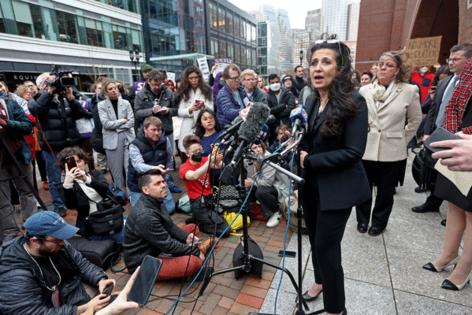Tufts University graduate student arrested by ICE has case moved to Vermont
Published in News & Features
BOSTON — The federal case against the Turkish Tufts graduate student arrested last month by ICE agents while walking down the sidewalk has been transferred to Vermont from Massachusetts.
Six officers with U.S. Immigration and Customs Enforcement apprehended Rumeysa Ozturk, 30, as she walked down the street in Somerville at around 5:25 p.m. on March 25.
The Tufts University Child Study and Human Development doctoral student from Turkey had no prior notice her student visa had been revoked before she was “stripped of her cellphone and backpack, handcuffed, and taken into custody in an unmarked vehicle,” according to a summary of undisputed facts by U.S. District Court Judge Denise J. Casper in her order to transfer the case.
A venue fight was precipitated by multiple ICE transfers of Ozturk through New Hampshire, Vermont and finally to Louisiana, where she is being held in a detention facility. Federal prosecutors argued that Ozturk’s case should be based where she is held, whereas defense attorneys and third-party filers argued it should stay in Massachusetts or be moved to Vermont.
Over the course of 26 pages of legal reasoning, Judge Casper sided with the Vermont argument.
“For the reasons articulated,” Casper wrote in her order, “the Court DENIES the government’s motion to dismiss this Petition and its alternative request to transfer this matter to the Western District of Louisiana. The Court ALLOWS the alternative relief sought by Ozturk and transfers this matter ‘in the interest of justice’ … to the U.S. District Court for the District of Vermont.”
Transfers
Casper’s order goes over the history of Ozturk’s arrest by the plainclothes ICE officers, “several wearing masks and/or hoods,” and the confusing history of her government transfers over the next 22 hours.
“Ozturk has filed multiple affidavits from experienced, immigration attorneys in the New England area that attest that the sequence of events here was far from routine, even putting aside the circumstances of her arrest,” Casper wrote.
On the contrary, Casper wrote, “the government attests that ‘(t)ransfers out of state, and out of the ERO Boston area of responsibility, are routinely conducted after arrest, due to operational necessity and considerations.’”
Ozturk was arrested in Somerville at around 5:25 p.m. on March 25 and then taken to Methuen, where she arrived at 6:22 that evening, Casper summarizes. Fourteen minutes later, she was off to Lebanon, N.H. Just after 9 p.m., she was transferred to the ICE Field Office in St. Albans, Vt., where she arrived just before 10:30 p.m. There she was processed for her Notice to Appear and spent several hours.
At 4 a.m., officers took Ozturk to the airport in Burlington, Vt., where she was placed on a 5:31 a.m. flight to Alexandra, Louisiana, where she arrived at about 2:35 p.m. She was then detained at the South Louisiana Correctional Facility in Basile.
Why Vermont?
Attorneys for Ozturk — and even the Turkish consulate — were “unable to determine her whereabouts” from the government. Attorneys filed a petition at 10:02 p.m. on March 25 in the Massachusetts district court seeking information. Less than an hour later, Judge Indira Talwani ordered the government not to move Ozturk from the state without providing 48 hours notice.
It is largely because Ozturk was physically in Vermont at the time the petition was filed that the state was handed the case.
Prosecutors argued that a petition for habeas corpus is an action on the authority that holds the petitioner in custody to free her, and not an action on the one in custody so the proper venue would be a district court in Louisiana.
Casper concludes that it was not an error on the defense that the petition was filed in a state where Ozturk was not present, as the government did not disclose to the defense Ozturk’s location until the afternoon of the next day.
Allegations
The Department of Homeland Security has stated Ozturk was arrested due to “support of Hamas,” without providing further information. Government officials reportedly told Tufts University her presence in the country would result in “potentially serious adverse foreign policy consequences for the United States,” the university wrote in a statement of support for Ozturk on Wednesday.
Ozturk was one of four authors of a March 26, 2024, op-ed in The Tufts Daily, the student newspaper of her university, titled “Try again, President Kumar: Renewing calls for Tufts to adopt March 4 TCU Senate resolutions.”
Casper summarizes the government’s position: “As alleged, Ozturk’s current visa status aligns with new policy directives from President Donald Trump who, after assuming office, signed two Executive Orders aimed at fulfilling a campaign promise to revoke the visas of students he characterized as ‘Hamas sympathizers.’”
The op-ed never mentions Hamas. It calls for the university to accept student senate-passed resolutions “demanding that the University acknowledge the Palestinian genocide, apologize for University President Sunil Kumar’s statements, disclose its investments and divest from companies with direct or indirect ties to Israel.”
_____
©2025 MediaNews Group, Inc. Visit at bostonherald.com. Distributed by Tribune Content Agency, LLC.







Comments